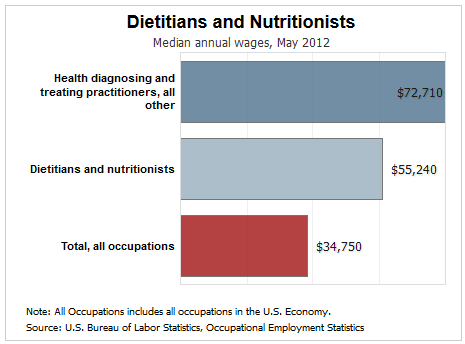
As the wellness trend sweeps the country, interest in good nutrition and healthful food is also rising. Consumers are increasingly looking to improve their eating habits, while demanding that good taste not be sacrificed. That's where the emerging field of culinary nutrition is playing a role. If the idea of promoting healthful eating habits while creating menus with delicious, appealing food inspires you, learn what it takes to become a culinary nutritionist.
What Does a Culinary Nutritionist Do?
Typically, a culinary nutritionist creates a meal plan, balancing health needs with food appeal. In a hospital or nursing facility, the culinary professional will have to create meals that meet the nutritional needs of patients managing health issues such as obesity, kidney failure, high blood pressure, diabetes or other problems. For instance, a culinary nutritionist might develop meals low in sugar and other carbohydrates for persons with diabetes, or diets low in protein for kidney patients.
In an educational facility, the nutritionist might develop meals aimed to appeal to a particular age group, such as young children, while still offering health benefits for growing bodies. In some restaurants, the demand for an alternative to high-calorie or high-fat menu items may result in a chef or owner hiring a nutritionist to help plan more healthful options that still have consumer appeal.
What Jobs Are Available in Culinary Nutrition?
The culinary nutrition field offers numerous opportunities for employment. Restaurants, for instance, are paying closer attention to consumer demands for more nutritious food. The challenge is to create dishes that meet this demand, but that also appeal to the palate. The same goes for schools, hospitals and rehabilitative or senior care facilities. Institutional food that has long been known as indifferently prepared, tasteless and unappetizing is no longer acceptable as students, patients, and residents demand better quality.
The culinary nutritionist might start his or her own practice or work as a consultant, while others might find employment in nursing homes, schools, hospitals, health resorts, cruise ships, a private or test kitchen, spas, airlines, supermarket chains or catering companies.
How Do You Prepare for a Career in Culinary Nutrition?
By successfully completing a program leading to a degree in culinary arts and applied nutrition, you could get the skills employers require for this profession. The program should offer you hands-on time in a professional kitchen where you can develop your basic culinary skills, while studying dietary management and the science of culinary nutrition. A program that offers the student an opportunity for an internship in a professional kitchen is also something to look for when considering a culinary education.
Here are some of the basic cooking courses that you might study at culinary school:
- Kitchen organization
- Cooking methods and principles
- Fundamentals of baking and pastry making
- Cooking meat, poultry and seafood
- Techniques for plating and presentation
Nutrition courses should focus on preservation of taste and flavor, as well as presentation. Among the courses the student might take: dietary conditions and therapies, nutrition analysis and recipe modification, alternative cooking and baking techniques, menu planning and development and ingredient integrity and sourcing.
Courses in culinary operations management should also be pursued, as students need to learn how to maintain an efficient, safe kitchen that is regulation-compliant. Issues pertaining to specialized diets and high-risk populations are also important. The student will need to study kitchen sanitation and safety, patient service and etiquette, purchasing and storeroom management, and Hazard Analysis and Critical Control Points (HACCP) planning, which is a food safety management system involving control of biological, chemical and physical hazards.
How Much Can You Expect to Earn as a Culinary Nutritionist?
 As of 2012, the median annual salary of a nutritionist/dietitian was $55,240, according to the BLS. The job outlook for nutritionists is good, with the BLS projecting a 21 percent growth rate from 2012 until 2022 – faster than average for all occupations, as nationwide, improved nutrition receives more attention in health care and in commercial settings.
As of 2012, the median annual salary of a nutritionist/dietitian was $55,240, according to the BLS. The job outlook for nutritionists is good, with the BLS projecting a 21 percent growth rate from 2012 until 2022 – faster than average for all occupations, as nationwide, improved nutrition receives more attention in health care and in commercial settings.
#tbt day before I started my first culinary class, to a year later on my last day at ecpi... Can't… https://t.co/jGDdmI8IOe
— Hunter Gibson (@Hunterrr12) February 7, 2014
What's the Next Step to Become a Culinary Nutritionist?
Interested in launching a new career as a culinary nutritionist? Contact ECPI University today. You could earn your Associate of Applied Science degree in Culinary Arts and Applied Nutrition in as little as 15 months. It could be the Best Decision You Ever Make!
DISCLAIMER – ECPI University makes no claim, warranty or guarantee as to actual employability or earning potential to current, past or future students or graduates of any educational program we offer. The ECPI University website is published for informational purposes only. Every effort is made to ensure the accuracy of information contained on the ECPI.edu domain; however, no warranty of accuracy is made. No contractual rights, either expressed or implied, are created by its content.
For more information about ECPI University or any of our programs click here: https://www.ecpi.edu/ or https://ow.ly/Ca1ya.


